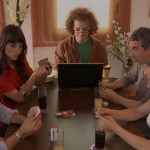¿Lo conozco?
Paco goes to Eva’s office to talk about a friend of his.
In this episode you will learn: how to give advices in Spanish, how to react to a critic in Spanish, how to talk about a friend in Spanish.
PACO: Buenos días, ¿se puede?
EVA: Adelante, buenos días, Paco. ¿Qué te trae por mi consulta?
PACO: Nada… quería hablarte de un amigo.
EVA: !Qué interesante¡ Siéntate en el diván y explícame.
PACO: ¿Dónde está el diván? Si esto es una hamaca de la playa.
EVA: Bueno, sí, ¿qué pasa? No tengo dinero.
A qué has venido, ¿a criticar mi mobiliario o a hablar de un amigo?
PACO: Te explico… Es un amigo de hace 3 ó 4 años. Éramos uña y carne.
EVA: Interesante…
PACO: Hemos dormido juntos.
EVA: ¿Lo conozco?
PACO: Sí, claro, vive en este piso.
EVA: Pues no caigo.
PACO: Incluso compartimos lavabo.
EVA: Sigue, sigue.
PACO: Pues hará unas dos semanas conocí a otro, y creo que me he vuelto a enamorar.
EVA: Sí, y…
PACO: No sé cómo decirle que nuestra relación ya no es igual que antes y que todo es por su culpa.
EVA: La culpa siempre es compartida.
PACO: En este caso, no. Cuando estoy mucho rato con él se bloquea y me deja colgado. Por no hablar de la velocidad…
EVA: Me estás dejando a cuadros. El único consejo que te puedo dar es que hagas lo que te dicte el corazón, aunque le puedas hacer daño.
PACO: ¿Sí?
EVA: Sí.
PACO: Gracias por el consejo, mañana mismo tiro este trasto y me compro un mac.
PACO: Good morning. May I come in?
EVA: Come in. Good morning, Paco.What’s going on with you?
PACO: Nothing … I wanted to talk about a friend.
EVA: Interesting! Sit on the couch and explain.
PACO: Where’s the couch? This is a beach hammock.
EVA: Well yes, what’s wrong? I have no money.
What have you come to? to criticize my furniture or to speak about a friend?
PACO: I explain…This is a friend of 3 or 4 years ago. And we were inseparable.
EVA: Interesting …
PACO: We slept together.
EVA: Do I know him?
PACO: Sí, claro, vive en este piso.
EVA: Pues no caigo.
EVA: Well, I don’t get it.
PACO: We even share the toilet.
EVA: Go on…
PACO: Well about two weeks ago I met another one, and I think I´ll fell in love again.
EVA: Yes, and…
PACO: I do not know how to tell him that our relationship is not the same as before and that is all his fault.
EVA: Blame is always shared.
PACO: In this case, no. When I’m longer with him, he jams and it leaves me hanging. Not to mention the speed …
EVA:You’re stunning me. The only advice I can give you is that you do what your heart says, though you can harm him.
PACO: Yes?
EVA: Yes
PACO: Thanks for the advice, I’ll get rid of this piece of draft tomorrow and I´ll buy a mac.
Juan y yo somos uña y carne.
Juan and I are nail and flesh.
This expression means we are inseparable. We are very close each other, really good friends.
No caigo en quién es esa persona de la que hablas.
I don’t get who’s this person you’re talking about.
CAER EN + ALGO, means to understand something or to remember something.
Hará unas dos semanas que trabaja aquí.
There will be a couple of weeks, he works here.
HARÁ, futuro verbo HACER. There’s a use of future which is to use future with a sense of present tense, meaning probability. When we are not sure of something in the present, we use the future. Examples: ¿Qué hora es? No sé, serán las dos. ¿Dónde está Juan? Estará en clase.
Me he vuelto a enamorar de un chico de mi oficina.
I felt in love again with a boy from my office.
VOLVER A + INFINITIVE. This is a periphrasis, which means to do something one more time. Example: He vuelto a estudiar español.
Me estás dejando a cuadros.
You’re stunning me.
DEJAR A CUADROS (a alguien) is a expression which means you are surprising so much someone that it is difficult for this person to react.


